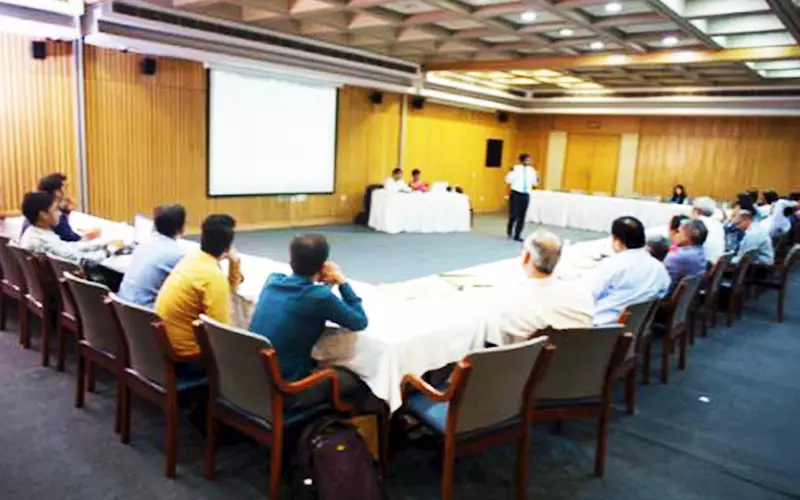Roundtable on GST and other new skills at Jumpstart 2017
The ninth edition of Jumpstart, the annual conference for children’s content creators, organised by German Book Office, New Delhi, was held at the India International Centre on 4 and 5 August 2017. The theme of this year’s Jumpstart was ‘Learn + Innovate’, which looked at learning in new ways, and its impact on authoring blended experiences.
23 Aug 2017 | By Dibyajyoti Sarma
According to GBO, this edition of Jumpstart was envisioned as a forum to create new pathways, make new stories, learn new skills and understand new technologies in children’s learning. The sessions and masterclasses that unfolded over the two days fulfilled the thought and concept behind this event.
Talking about the new skills, shifting the focus a bit to accommodate the current concern affecting publishers and book printers, a roundtable on GST was held on the first day of Jumpstart 2017 on 4 August. Tax experts Sujit Ghosh, partner at Advaita Legal, and Sanjay Garg, partner, Indirect Tax, KPMG India, led the discussion, moderated by international publishing consultant Jaya Bhattacharji Rose.
The speakers talked about the history of printing services and nature of contracts, explaining the difference between goods and services in the light of GST. Q&A about sale of rights, warehousing, transfer of intellectual property or product knowhow, non-GST inventories and application of different tax slabs led to a deeper understanding of operational knowledge of GST.
Though books are non-taxable commodity, the publishers produce a range of products, audio books or eBooks to name a few, there is a need to re-evaluate the implications. The panel answered how these taxes are important in streamlining fragmented industry and brining in advocacy to guide production.
The first day of Jumpstart 2017 saw an attendance of nearly 150 participants. The sessions opened with a welcome note from Prashasti Rastogi, director, German Book Office New Delhi.
The plenary session, ‘Checkpoint Learning: Where are we now?’ with author Sonia Duggal, education entrepreneur MM Pant, educationist Nina Sehgal, and school student Rohit Nema, was moderated by Amit Kaushik, CEO of Australian Centre for Educational Research. The diversity of the panel enriched the discussion as they talked about the current scenario of learning in urban Indian classrooms, and the pain points and possible solutions for the same.
‘Plug ‘n’ Play: Game-based Learning’ started with a live poll conducted by the session moderator Vishnu Karthik, associate director, The Heritage Schools. Session speakers Amruth BR, CEO of GuruG Learning Labs, and Jairaj Bhattacharya, CEO of ConveGenius discussed how teachers can adopt and have adopted game-based learning practices as well as gamification practices to improve student learning in their classroom, and how creators need to rewire their content to eliminate cognitive biases for making an impact in gamified systems.
Celebrated dancer and choreographer Geeta Chandran had the audience listening in rapture during her session on ‘Dance in Education’. She spoke about the need to understand dance as co-curricular, and how it is being integrated with academic learning. She followed her talk with a mesmerising demonstration of Tandava Dance.
The event remained houseful since the beginning of the first session, and the audience was glued to the seats with the lineup of sessions and speakers as Devdutt Pattanaik came up on stage next. The master storyteller shared his take on the culture of stories coupled with his renowned manner of storytelling. His keynote address on stories flowed into the following session, ‘Plug ‘n’ Play: Storytelling for Learning Outcomes’. On the panel were author Venita Coelho, storyteller Rituparna Ghosh, and illustrator Mortiz Stetter, moderated by educationist Preminda Langer. Different modes of storytelling — oral, written and visual — were brought together under the theme of children’s learning as the panelists presented their work and discussed the impact of storytelling in creating a way of learning which is more integrated with life experiences.
The final event of the day, Jumpstart Expert Tables saw select participants get a chance to interact with the experts of their preference in a 5-minute speed-dating format. Amruth, Moritz Stetter, Preminda Langer, Rituparna Ghosh, V. Anand, Venita Coelho and Manisha Chaudhry were the experts with whom the participants interacted.
The second day was about practising all that was learnt through discussions and interactions on Day 1. The four intensive masterclasses, which ran parallel to each other, were all filled with participants from various spheres of children’s learning and content creation.
In the Storytelling Masterclass by Rituparna Ghosh, the mélange of teachers, educators and children’s content creators were familiarised with the elements of storytelling and its impact on children via a thorough discussion with the expert Rituparna Ghosh, who also shared certain key storytelling skills through exercises like storyboarding and playacting.
The Writers’ Masterclass by Venita Coelho saw a dynamic creative and intellectual engagement as Coelho busted myths about creativity and pressed on the need for discipline. She took examples of her own process and work to trace a writer’s process. The workshop also focused on understanding elements of a story via multiple exercises.
Illustrator Moritz Stetter kicked off the Illustrators’ Masterclass with a display of his process diaries and final works. He explained his artistic process and answered related queries. The participants were requested to come with an idea or a story that they developed through the technique of storyboarding while receiving continuous feedback from the expert.
Self-based learning was the primary theme on which V Anand elaborated the Millennials’ Masterclass. Through detailed exercises, focusing on interactivity and engagement, the expert talked about digitising storyboards for learning and gave an introduction to technical know-how for digital content creation.
 |











 See All
See All